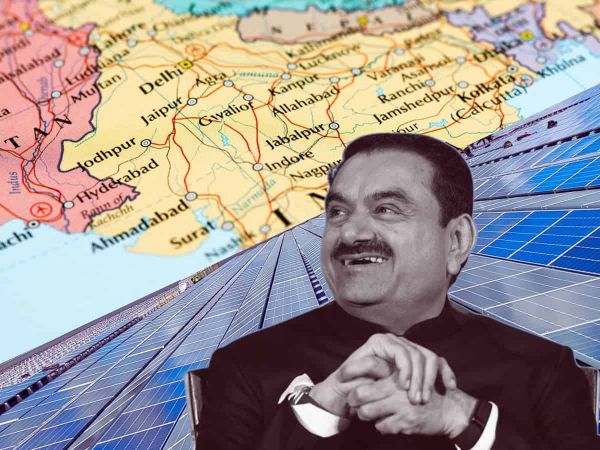
Indian conglomerate Adani Group has benefitted from the Union government overriding senior army officials and relaxing the country’s border security norms, alongside the Indo-Pakistan border in Gujarat, reports The Guardian.
According to the report, the Adani Group is building its flagship solar and wind energy park alongside the Pakistan border in Rann of Kutch, on lands leased from the Gujarat state government.
The reports say Adani Group’s Khavda plant, which is supposed to be the largest solar plant on the planet, is laying solar panels and wind turbines one kilometre away from the border. Until recently, no major construction was allowed up to a 10-kilometre distance from the Indo-Pakistan border, according to the military safety protocols.
The Guardian report claims that according to confidential meeting minutes it viewed, the Gujarat state government lobbied “at the highest levels” to reduce the no-construction buffer zone, which would benefit the Adani group.
The report says that following letters by the Gujarat government to the Prime Minister’s Office, a confidential meeting was held in April 2023, which was attended by Gujarat state officials, the Union ministry of renewable energy, and the director general of military operations.
According to the report, senior military officials raised “apprehensions” over tank mobilisation and security surveillance along the Indo-Pakistan border in Gujarat. These concerns were countered by the developers’ assurance “that solar platforms would be adequate in mitigating any threats from enemy tank movements.”
Military officers also raised concerns over the size of the solar panels and requested adjustments, which were reportedly rejected by the developers, stating it would not be financially viable. The meeting ended with the defence ministry agreeing with a “mutual consensus” to the demands made by the Gujarat government, which in turn, would benefit the Adani Group.
The Guardian claims that the defence ministry, within a month, amended the nation’s security protocols about India’s sensitive borderlands, helping the Adani Group to make the project ‘financially viable’.
The border security relaxation made by the central government was not specific to just the concerned Indo-Pakistan border but was a whole national policy change. This means India’s sensitive border areas with Nepal, China, Bangladesh, and Myanmar are now open to mega-construction projects.
A notification was issued to all ministries confirming a relaxation of the guidelines around infrastructure development, which applied not only on the India-Pakistan border but also on land adjoining Bangladesh, China, Myanmar and Nepal.
Senior Indian army officers, overseeing operations in the sensitive border area were reportedly not consulted about the decision, raising surprise and concern among army ranks.
“What happens if there is the need to lay mines, anti-tank and anti-personnel? What about the concept of space and surprise in offensive and defensive operations?” The Guardian quoted an army officer.
The Adani Group’s Khavda plant has been part of a larger debacle after the group’s supremo Gautam Adani and his close aides were indicted by the US Government for forgery and cheating American investors, over alleged corruption he was involved in renewable-energy purchase agreements with state governments.
The contended energy deals were supposed to be produced from the same Khavda plant, for which India’s defence ministry has reportedly bent its security protocols.